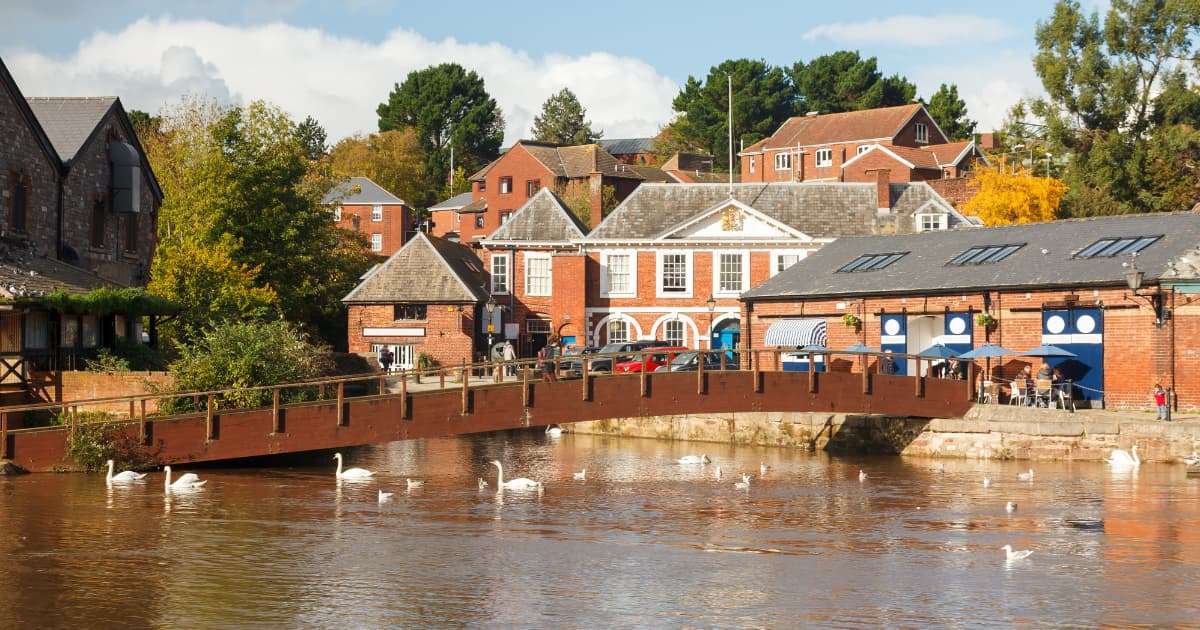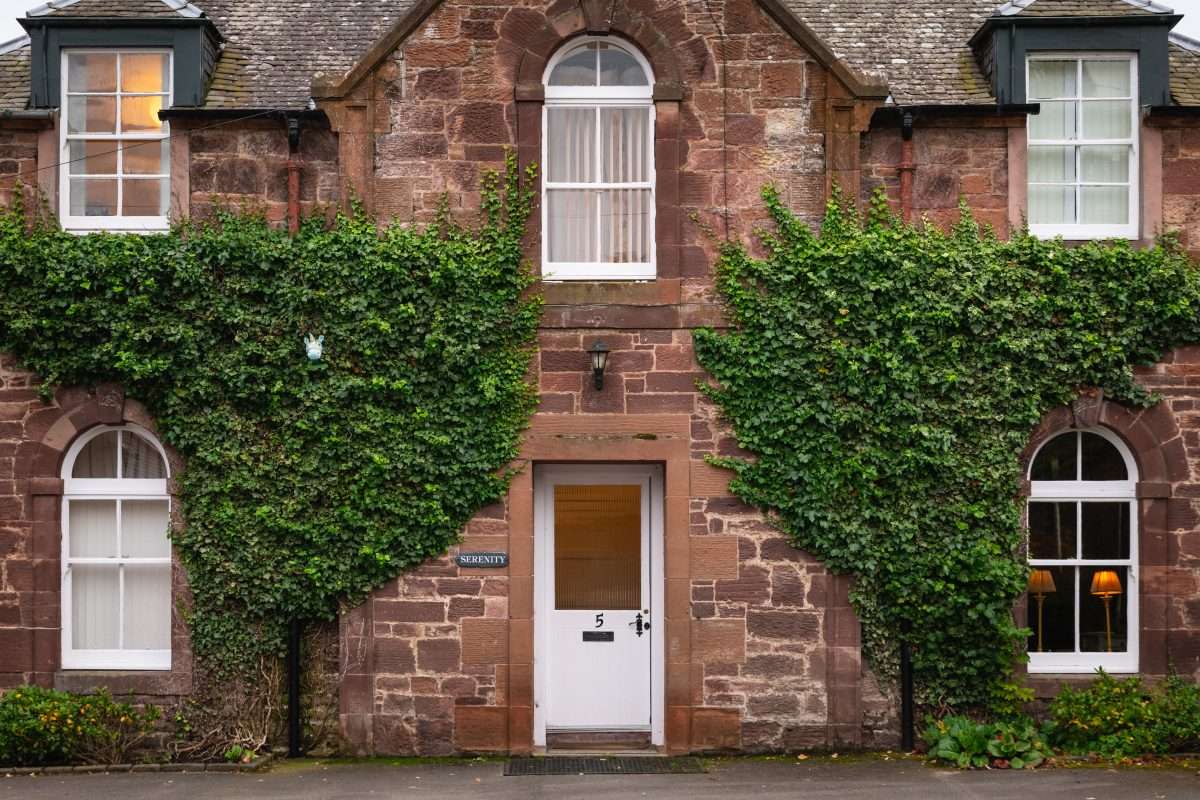
Your Path to Alcohol Recovery Begins Here
Castle Craig is a leading residential drug and alcohol rehab located in the Scottish Borders serving people from across the UK, including Exeter. We provide treatment for alcohol addiction, accessible through private funding, private health insurance, and Royal Devon University Healthcare NHS Foundation Trust referrals.
Table of Contents
We frequently welcome private patients from Exeter to our residential rehab centre based in West Linton, and can arrange private transport services to ensure a safe journey to us.
Our addiction treatment is covered by major UK health insurance providers, and individuals under the funding of the NHS in Exeter can be referred to Castle Craig for inpatient addiction treatment. We also offer aftercare counselling online, allowing you to receive support from your home in Exeter.
Additional services available to those in Exeter include interventions, which can be conducted at your home or online, to help people accept they need help. We also list various free alcohol and drug treatment services available in Exeter on this page.
How to Know if You or a Loved One Needs Rehab for Alcoholism?
Alcoholism is characterised by an inability to stop consuming alcohol despite the risks involved. The user has little to no control over this physical and emotional compulsion.
Continuous heavy drinking over a long period leads to alcoholism. The body develops a tolerance to substances like alcohol over time, and eventually, the brain adjusts to its presence. Alcohol withdrawal is a response from the central nervous system that occurs when drinking is abruptly stopped. The brain tries to adjust to its absence.
There are signs you should watch out for if you have concerns about your drinking patterns or if you think someone close to you might have a drinking problem. The most obvious signs of alcoholism are those that are behavioural and physical, such as excessive sweating, shaking, withdrawing, lying, etc.
To stop the illness from worsening, you should seek help as soon as you exhibit signs of drug or alcohol dependence and withdrawal symptoms.
How to Help Someone With Alcoholism
Although private inpatient rehab is the most effective alcoholism treatment, talking to a loved one about addiction can be challenging because an alcoholic may not be aware of their condition.
Scheduling an intervention could be a good solution if you are struggling to communicate effectively with someone you care about. This might entail gathering the family together or hiring a qualified interventionist, both of which could assist in persuading the person to seek therapy.
You could suggest to your loved one that they go to 12-step meetings like Alcoholics Anonymous or Narcotics Anonymous as an alternative if they are reluctant to pursue inpatient or outpatient treatment. They might benefit from receiving support and direction at these meetings as they work towards recovery.
Free Alcohol Help Services In and Around Exeter
Alcohol Addiction Statistics in Exeter
According to the most recent data from the Office for National Statistics (ONS) and Public Health England, Exeter is dealing with alcohol addiction (PHE). In 2020, there were 35 alcohol-related deaths in Exeter, resulting in a death rate of 11.4 per 100,000 people, just slightly lower than the national average of 11.7. However, Exeter had a higher rate of hospital admissions due to alcohol-related harm than the national average, with a rate of 1,257 per 100,000 population compared to the national average of 905.
According to data from Public Health England (PHE)

What Happens at Alcohol Rehab?
We recognise that many people may find going to an alcohol treatment facility intimidating because they are unsure of what to expect. At Castle Craig, we place a strong emphasis on individualised care, and our committed staff works hard to create individualised rehab programmes that cater to the unique needs of each patient. Our objective is to create a welcoming environment that supports successful healing.
Therapy for Alcoholism
Detoxification prepares the body for addiction treatment. Detox is required, but treatment goes beyond that. Our psychological treatment approach helps patients identify and develop effective coping skills. We believe that psychological treatment is critical to recovery and provide our patients with the tools and support they require.
Some of the therapies we offer include:
- Psychoeducational lectures and workshops
- Chronic pain therapy
- Inspirational guest speakers
- Men’s and women’s group
- LGBTQ+ aware
- Trauma therapy












Alcohol Detox
It is essential to be in a secure, comfortable, and motivating environment when dealing with the challenging emotional and physical aspects of detox. To concentrate on your physical well-being and get you ready for the psychological path to addiction recovery, Castle Craig offers a separate medical detox centre.
A detox period usually lasts between 7 and 10 days, but this can change depending on how much and how often someone drinks.
Medications are typically prescribed during detox to ease the symptoms of withdrawal.
Some of the most commonly prescribed medications include:
- Chlordiazepoxide (Librium)
- Valium (Diazepam)
- Clonazepam (Klonopin)
- Lorazepam (Ativan)
Alcohol Detox at Home
Even though we know that not everyone will be a good fit for inpatient rehab, it is important to know that alcohol detoxing on your own is not recommended. Some alcohol withdrawal symptoms can be fatal if not properly treated, and they can even be extremely dangerous.
Call Castle Craig at once at 01721 546 263 if you require alcohol detoxification or if someone you know is exhibiting signs of alcoholism.
Inpatient vs Outpatient Alcohol Rehab
For drug and alcohol rehabilitation, there are two basic treatment options: residential rehabilitation, also known as inpatient rehabilitation and outpatient rehabilitation.
Outpatient rehabilitation requires you to simply attend on-site therapy sessions, whereas inpatient rehabilitation entails staying at the clinic for the duration of the treatment programme.
| Benefits of Inpatient Alcohol Addiction Treatment | Cons of Inpatient Alcohol Addiction Treatment |
|---|---|
| The benefit of inpatient rehabilitation is that you will receive ongoing care and support throughout your stay. Although going to a private rehabilitation facility offers prescription medication to ease the withdrawal symptoms, the process of alcohol withdrawal can be exhausting. In addition, a doctor is always on call to offer extra medical help. | People might not get inpatient treatment because the cost of private rehab facilities can be high. However, many institutions offer a range of financing options, such as payment plans and government subsidies to make treatment more accessible. |
| Benefits of Outpatient Alcohol Rehab | Cons of Outpatient Alcohol Rehab |
|---|---|
| Outpatient addiction treatment is less expensive than residential treatment and provides more flexibility for people who have jobs or children. Furthermore, outpatient rehab allows you to put your newly acquired recovery skills to use. | Outpatient addiction treatment raises significant concerns about potential exposure to external triggers that can lead to a relapse. Furthermore, outpatient rehabilitation does not provide ongoing medical care from healthcare professionals. Furthermore, outpatient care does not include detoxification, which should be completed before beginning therapy as a separate process. |
To avoid daily stressors and concentrate solely on their recovery, many people choose to receive addiction treatment in an environment that is different from their usual settings. The fact that we have a proven track record of successfully treating addicts is just one of the many factors that influence people’s decisions to begin their road to recovery with us. Thousands of people from all over the United Kingdom have visited Castle Craig because of our superior care, wide range of services, expert therapies, and committed family support.
We at Castle Craig think that everyone who walks through our doors deserves a fresh start. Our therapeutic techniques help patients maintain their recovery and lead fulfilling lives.
In the beautiful Scottish Borders, our facility is surrounded by 50 acres of private woodland. It is a safe place for people to get better, giving them freedom and a break from the outside world.
Our consultant psychiatrists, who specialise in treating complex dual diagnoses and addiction, are available around-the-clock, seven days a week. Prescriptions are written and patient care is assessed by our medical directors. Our team is dedicated to giving patients the best care and supporting their recovery.
FAQs
How Much Does Alcohol Rehab Cost?
Depending on the kind of rehab and whether it is residential or outpatient, the price of drug and alcohol treatment can range from £2,000 to £5,000 per week. The price will also vary according to your location, length of stay, and treatment regimen.
How Long Does Alcohol Rehab Take?
We recommend a minimum of five weeks for patients to fully detox and benefit from the many addiction therapies we offer.
Does Alcohol Rehab Work?
Addiction therapy works if you put in the effort. It is up to you to continue the effort once you are discharged from residential rehab, even though the therapies provided there are designed to assist your sobriety long after you leave.
Is Alcohol Rehab Covered by Insurance?
Alcoholism, drug addiction, and other mental illnesses are treated by some insurance companies. Check with your provider to see if your policy covers private rehabilitation.
How to Get Someone Into Alcohol Rehab?
We understand that asking for help might be intimidating when you don’t know what to expect. That is why we are here to listen to you and assist you or a loved one in beginning the road to recovery. From your initial call to the time you walk through our doors, our team is here to help you through the inquiry and admissions process. Call us now on 01721 546 263 to speak with a member of our admissions team.
Experts You Can Trust
With a wealth of knowledge and services to help you regain control of your life, request a call-back from one of our professionals today. The choice you make today could change your life forever.